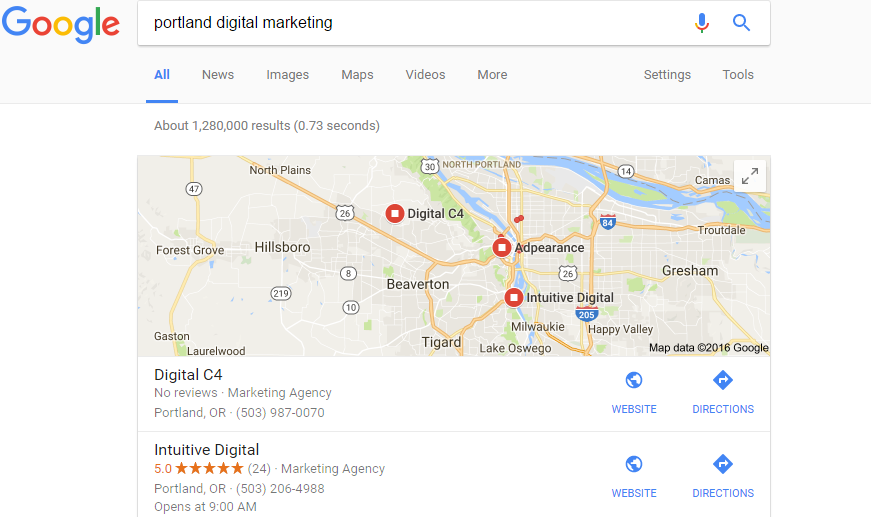To not rank after months of content creation is enough to drive anyone bananas. Maybe the problem isn’t that you aren’t targeting enough keywords, it’s that you’re not targeting the right keywords for your small business.
If any of the following kinds of keywords look familiar, you’ll at least know what the culprit is and can avoid it moving forward. Better late than never!
1. Keywords that are too broad.
We all remember when we thought a keyword was actually a single word. Ha!” #seo #longtailkeyword
@OSC_WebDesign
In the young days of the web it was indeed possible to rank for broad keywords, but now our only hope is to string together a few of them.
For example, imagine you’ve just launched an eCommerce website to sell sneakers. How likely do you think you are to rank high for ‘shoes’? You have an extremely slim chance if any at all.
Now if you were to target ‘white womens new balance sneakers’, yes, it is searched less, but your chances of ranking would greatly increase. Another benefit is that users searching this keyword are much more likely to convert and buy your product.
2. Keywords that are too specific.
With keywords, there’s a fine line to walk between too broad and too specific.
If your string of keywords is too particular, it could be that nobody’s searching them at all. Use Google Trends to get an idea of whether your keywords are popular or unused.
3. Keywords that don’t focus on user-intent.
Keyword #userintent should be as high of a priority as competition & search volume.” #seo
@OSC_WebDesign
Our small business, OSC Web Design, is based in Maine. One of the keywords we found with a high search volume was ‘portland digital marketing’. We’re located close to Portland, Maine and might have targeted that keyword if we didn’t check for user intent.
To do this we simply type the keyword into Google. Lo and behold, users aren’t looking for digital marketing in Portland, Maine at all. They’re looking for digital marketing in Portland Oregon.
While this is a more obvious example, there are plenty of situations you may run into that aren’t so clear. If you have a shadow of a doubt in your mind on the user-intent behind a keyword, take an extra moment to enter it into Google!
4. The same keywords you always target.
Maybe you have one keyword that you’re particularly fond of. You two go waaay back and you’re sure to include it in every paragraph, title, and meta.
We regretfully inform you it’s a big no-no. Each page of your website is a new opportunity to rank for an individual keyword and draw in a new portion of your audience. If you’re targeting the same keyword you’ll be attracting the same kind of traffic.
Even worse is that if you do begin ranking for the keyword, you’ll begin competing against your own pages to rank in the future.
5. Keywords that have too much competition.
You’re probably thinking “duh” right now, but there’s been a lot of misconception in the SEO world on this.
Too often SEO consultants conduct keyword research in one step, using a single tool; Google’s Keyword Planner. At OSC we love the Keyword Planner but it should not be used alone. The score it provides for competition isn’t accurate for SEO purposes. The competition refers to bids on paid ads, not websites competing to rank in organic search results.
If you’ve been taking only this data into account while selecting keywords, it’s quite possible you think you’re targeting a keyword that has low competition but it’s actually very high in organic search results.
It goes both ways too, you may have passed over keywords with low organic competition in reality. The only way to know what you’re up against is by manually searching each keyword in Google and surveying the competition.
6. Keywords that don’t convert.
Conversion helps you reach your ultimate goal, whether it be a sale or more traffic, but it can also affect your rank. When you attract visitors that are likely to convert, it means they’re less likely to “bounce” from your website and more likely to share your website, both factors that come into play with rank.
More and more small businesses are beginning to realize the significance of targeting keywords that boost qualified traffic rather than just any old traffic. By defining your buyer personas and their unique purchase process, you can create content that helps move them down the sales funnel.
If you owned a landscaping business in Scarborough, Maine, would you rather target ‘what is landscaping’ or ‘landscapers in scarborough, me’?
‘What is landscaping’ is broad and it’s unlikely that user is looking to hire a landscaper. Someone searching ‘landscapers in scarborough me’ is likely shopping for a local landscaper and close to converting.
All in all, it’s important to dive a little deeper into the meaning of keywords before adding them into your small business’s website content. It’s not enough anymore to target a list of keywords to rank, you need to target the right keywords.




